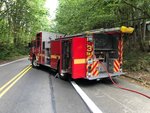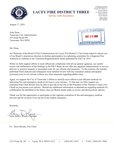

Cities make decisions all the time about whether to spend money on any given civic improvement, incentive program, service increase or addition. That’s simply how government works. And sometimes the voters get asked about whether we want to do it as is the case with the proposed Regional Fire Authority (RFA). So we, the voters, need to decide if the deal is worth it.
In order to decide we need to see the details, the data. We need an honest explanation and specifics about what we’re being asked to pay for. Show me the deal, and I’ll tell you if I think it’s worth it. But I need to understand the deal. Sadly that’s not the case with the proposed RFA.
What’s the problem?
What is the problem that Olympia and Tumwater are trying to solve? It’s definitely a challenge to find succinct or detailed information on their website about the specific proposal for the April 25 ballot. Olympia’s website is particularly unhelpful, all it does is point to Tumwater’s site: Regional Fire Authority. Most of what’s on that site has to do with process, but digging into what is there does help illuminate what the actual goal is, as well as a number of problems with the proposed RFA. Reasons such as “Improve efficiency” and “Highest quality fire protection” are meaningless slogans without measurable goals. Their information provides no specific, quantifiable improvements in service. After wading through what I could find the only driver I’ve been able to find for this effort is from Tumwater. It seems that they are concerned about funding their fire department, and this is a way to increase revenue.
I don’t see any language from either city that says we have a problem with the Olympia fire department. Fire districts are rated by the insurance industry; Olympia has a Class 2 rating out of ten classes. That’s a very good rating. There is only one city, Seattle, that has a higher rating. So Olympia has a good fire department. Tumwater is a Class 4, not as good. Is that a problem? Are they simply average? Is there a trend? I can’t tell. There is a Regional Fire and Emergency Services Study, that recommends a RFA, but never summarizes why or what would improve. There is virtually no summary information, no list of measurable outcomes, no explanation of measurable benefits. Although they did say that currently, “Each fire department, fire district, or fire authority provides the highest quality service available within their individually constrained means.”
No clear or stated benefits
I find no concise explanation of the proposed RFA, what it would cost, and what would be different. It takes a lot of time to dig around to understand it. At the Olympia Council meeting on October 25 last year there was a presentation that the joint councils received. It shows an organizational chart for the new system. This chart includes 10 new employees, none of them firefighters. One particularly enlightening document is the Department Organization & Strategic Financial Plan spreadsheet that was found through a Public Records request. This is where the actual numbers live.
There are increased costs
There are a number of cost increases in there for existing salaries that aren’t quantified anywhere else. There is $2 million each year for in overhead from the added positions shown in the RFA plan organizational chart. There is another $4 million over the 7 years covered by the spreadsheet to bring Tumwater’s fire department salary level up to “parity” with the higher paid Olympia fire fighters. Finally, there is another $2.8 in increases for both fire departments' firefighting staff to make the now bigger department "comparable" with other bigger fire departments.
The added Fire Benefit Charge
One supporting contention is that property taxes won’t go up; the $1/$1000 RFA increase will be offset by an equivalent reduction from the city portion of the property tax. But that isn’t the entire story. There is also going to be a new Fire Benefit Charge (FBC) included on the tax assessments based upon the area of a building’s square footage, including porches and garages.
There is a calculator on Tumwater’s website, FBC Calculator, so we can find out how much it would cost each of us. The site states that “Under the FBC, those who benefit more from fire protection services, such as large structures and structures that pose higher fire risk pay more for that service.”
But looking at an RFA PowerPoint presentation, that’s not the way the calculator actually works, it doesn’t include “Hazard Risks” in the calculation. The RFA Plan also states that the “Fire Benefit Charge (FBC) is not a tax, it is a fee,” but the name doesn’t matter, what counts is whose pocket it comes from. Regardless of what the FBC is called – charge, tax, fee – it’s an increase in spending and revenue. It’s an added cost for no identified increase in service or response time.
In addition, the language on the website says that “Costs cannot be firmly estimated until the Fire Authority Plan being developed by the Planning Committee is completed.” If that were the case, how can we (or they) tell if it’s a good deal? But as we now know, they do know the costs.
Decrease in Parks Funding
Here's another problem. In 2015 Olympia voted to create more parks, thus creating a Metropolitan Park District (which is a separate local government) that is funded by an interlocal agreement with the city of Olympia. In that Interlocal Agreement, 11% of Olympia’s General Fund goes to fund parks. With the creation of an RFA, the city property taxes that are lowered to pay for the RFA reduce the city’s general fund, which means less money is going to parks. The estimate is that this will result in about a $1 million hole in Olympia’s parks budget. So to make the park fund whole, and action formally requested by the City’s Park Advisory Board, and in line with the intent of the 2015 vote, the city needs to either transfer money from other city departments or raise their revenue by that amount. Which is another hidden cost of the RFA.
Not a “Regional” plan
It's a bit of a stretch to call the proposed RFA a “Regional plan”. It only includes Olympia and Tumwater. Regional coordination certainly makes perfect sense, and they are already doing that with Mutual Aid Agreements to coordinate services along adjacent boundaries. Lacey Fire District #3 looked at the RFA plan and its conclusion as written in an 8/20/2020 letter (see attached to this story) to John Doan, Tumwater City Administrator:
“… our careful review and deliberation of the findings in the ESCI Study do not offer any apparent enhancements to service delivery or positive impacts to associated costs for our citizens and taxpayers. To the contrary, the initially published fiscal analysis and subsequent more detailed review with the consultant outline anticipated increased costs to our citizens without any clear statement regarding added value.”
My conclusion
The conclusion I have come to is that the documents and detailed financial plan show an expansion of management staffing levels, increases in wages for existing staff, no improvements in response time, no new equipment, and no new firefighters. So there will be more revenue to the new district, but no assured increase in services. By definition, this means less efficiency. More efficiency means better service for the same or less money. Why would we want to do this? Why does anyone?
If Tumwater, or Olympia, think they need more money for their fire department, then say that. Tell us what you think you need, what it will cost, specifically why it’s needed, and exactly what the public will get if they raise their taxes. To do otherwise, like the RFA proposal, is less than forthright, erodes the public’s trust in their local government and elected officials, and wastes time and money that could be better spent elsewhere.
Pat Cole - pcbiglife@gmail.com - is a former member of Olympia's city council. As a private citizen, he seeks to set a positive tone and lead informed discussions about local civic issues.
EDITOR'S NOTE: The opinions expressed above are those of Pat Cole and not necessarily of The JOLT or its staff or board of directors.
Further, if you'd like to express your opinions, please write them up and send them to us, especially if you are focused on Lacey or Tumwater. If you've got questions about what would be acceptable, please call Danny Stusser on 360-357-1000 x1.
3 comments on this item Please log in to comment by clicking here
JulesJames
Wonderfully argued! Thank you. Particularly the explanation why Lacy didn't jump into the RFA. Printing this to hand out to voters.
Friday, February 10, 2023 Report this
JW
What I've heard communicated, albeit not terribly well, is that the RFA is forward-looking for the amount of growth we are having and will continue to accelerate. The problem with only looking at past performance is that it doesn't necessarily clue you in to falling off a cliff which sounds like the trajectory of the departments with how the call volumes have grown.
The biggest takeaway I've had over the past months is that there is inevitably going to be a cost increase, whether individually in both Tumwater and Olympia via a fire levy or by an RFA combining the two. The cost impact is coming, so we have to ask ourselves if combination will be the lesser of the two costs.
Saturday, February 11, 2023 Report this
DanaMadsen
Thank you Pat Cole for the well reasoned and nicely put analysis of the proposed RFA. Commenter JW noted that with increased population future costs will increase anyway. That may be, but as Cole noted there are immediately increases of $8.8 million in added direct costs PLUS making up the losses to the parks department PLUS the "fee" to each and every property owner designed to make the rate of "fee" higher for small properties and lower for large property owners. This RFA is a very bad deal and we should follow the lead of Lacey with our answer: No thanks.
Saturday, February 11, 2023 Report this